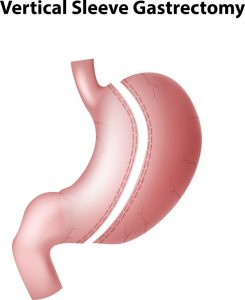
What is Gastric Sleeve Surgery?
Gastric sleeve surgery or sleeve gastrectomy is a weight loss procedure that works by reducing the size of your stomach. The operation can usually be performed laparoscopically, which means there is no need for open surgery. Instead, several small incisions will be made in your abdomen so that the surgical instruments can be inserted, along with a camera to allow the surgeon to see inside.
During the procedure, the doctor will remove up to 70% of your stomach. The remaining portion will be shaped into a tube or sleeve and sealed up with staples. Reducing the size of your stomach should help you to lose weight because you’ll feel full after much smaller meals. Your smaller stomach will also produce less of the hormones that stimulate your appetite, which should make it easier to cope with a strict diet.
Common Side Effects
Everyone will experience some side effects after gastric sleeve surgery, as a result of the anaesthetic and the procedure itself:
- You will feel sore, drowsy and confused for a couple of days after the procedure.
- The surgical wounds will be painful, but you should be able to manage this with mild painkillers. You’ll also have to keep them clean and dry while they heal.
- You will have several small scars on your abdomen after the procedure, which should grow fainter over time.
- You should expect to feel tired as you adjust to your new diet, especially while it is restricted to liquids and soft foods in the first days and weeks.
- Digestive problems such as indigestion, nausea, and food intolerances can happen after a sleeve gastrectomy. The most common of these is acid reflux, but it isn’t usually permanent. You could also develop a nutritional deficiency if you’re not careful about your diet, but this is less common than for the gastric bypass procedure.
- As you lose weight, you will probably notice some sagging or loose skin. The amount will depend on your skin elasticity and the speed at which you lose weight. Although it is harmless, you might want to consider cosmetic surgery to remove it if it bothers you, once you’ve reached your target weight.
Less Common Complications
Approximately 96% of patients will recover from the surgery without experiencing any serious complications. However, a small number will develop some kind of problem. Your doctor will ensure that you know what to look out for so that you can seek help if you notice anything wrong. It is usually possible to tackle these complications as long as they are spotted quickly.
Possible complications for a sleeve gastrectomy include:
- Leaks from your stomach where it has been stapled shut. The staple line will be tested with a swallow test and scan before you eat anything, which should minimise the effects. However, if there is a problem, you might need another operation to fix it.
- Bleeding from the staple line. Even if the stomach remains sealed, you could experience some internal bleeding after the operation. If these is serious, you might need more surgery to stop it, but this is very rare.
- If there are any issues during the operation, the surgeon may have to switch to an open procedure instead. This means that you will have a larger surgical wound on your abdomen, which will leave a bigger scar. However, this is only done when it is medically necessary.
Risks of Surgery
As well as the risks that are unique to the gastric sleeve procedure, there are also some more general complications that can occur with any kind of abdominal surgery:
- Allergic reaction to the anaesthetic
- Heavy bleeding
- Blot clots, which could block blood vessels causing problems like deep vein thrombosis or a pulmonary embolism
- Infections
- Damage to the other organs in your abdomen, like the spleen or bowel
- Bowel obstruction caused by scar tissue or adhesion between the organs
In most cases, these complications can be treated during or after the operation. For example, you can be prescribed antibiotics to eliminate an infection or have surgery to repair any damage to your organs. However, there is a small chance that you could experience long term problems or even a life-threatening complication. In the worst case, the complications could be fatal.
Although these risks are very rare, it’s still important for you to be aware of them before the procedure. You need to be able to make an informed choice about your care. It’s also important for you to be aware of the steps you can take before and after the procedure to minimise the risks.
Should You Have Gastric Sleeve Surgery?
You will have plenty of time to discuss the risks and side effects of gastric sleeve surgery with your doctor before you decide to have the procedure. The doctor will be able to give you personalised advice that takes your medical history into account. For example, you may be at higher risk of certain complications if you have a condition such as heart disease or if you’re more likely to develop a blood clot. You will also get advice on what you can do to reduce the risks, such as giving up smoking to improve your healing abilities.
There will always be risks with any kind of surgical procedure, but the chances of serious complications are generally low. If your doctor agrees that you are fit enough for the operation then you will need to decide whether the benefits of weight loss surgery outweigh the risks. Your doctor can support you in making this decision, but ultimately it is up to you.
How do you feel about the risks of gastric sleeve surgery?


 Our Weight Loss Procedures During Covid-19 UPDATE
Our Weight Loss Procedures During Covid-19 UPDATE  ENG
ENG
 Arabic
Arabic French
French Chinese
Chinese